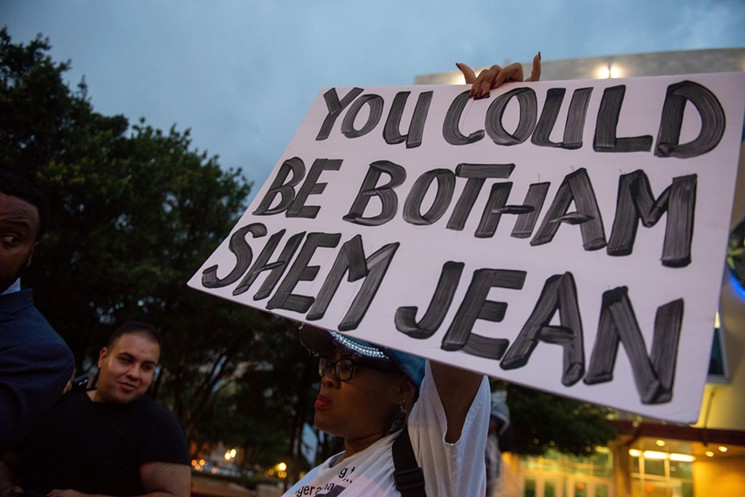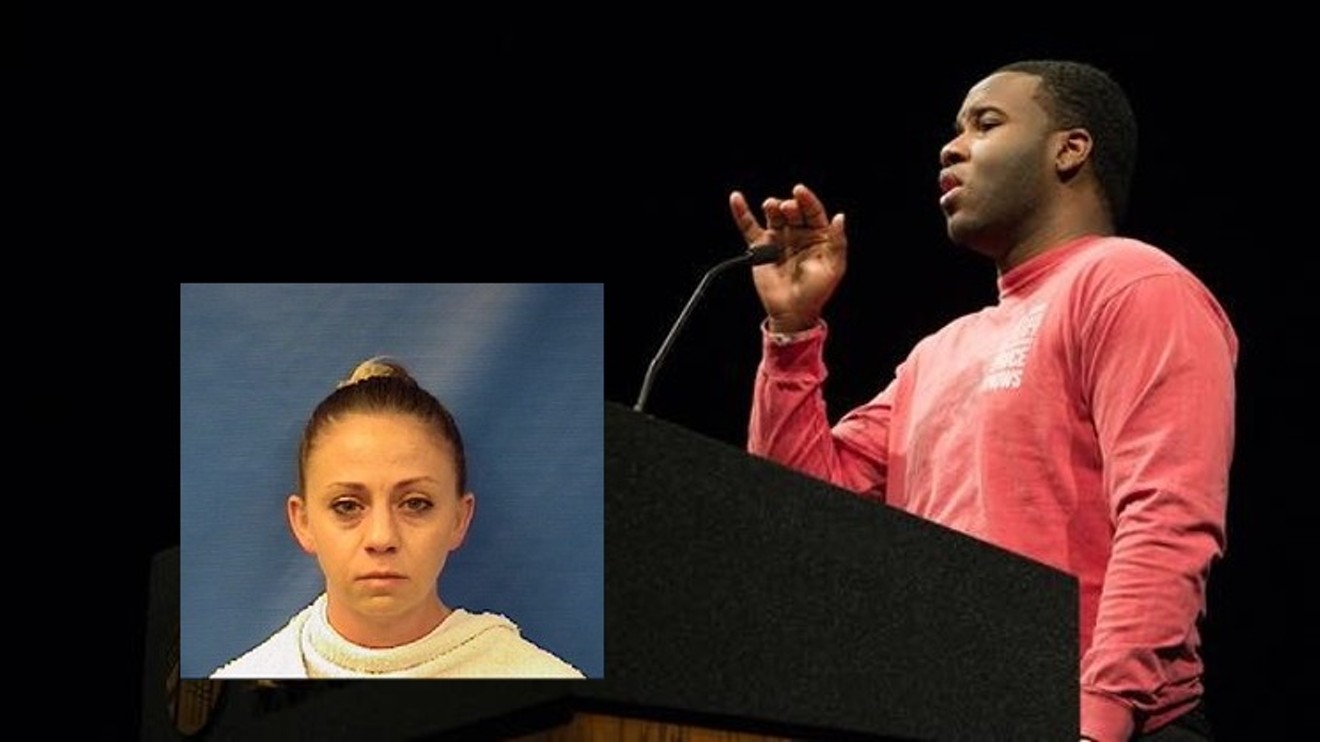A week ago the city’s only daily newspaper said in an editorial: “We worry, though, that the murder charge creates a greater risk of a not-guilty verdict.”
They wanted a manslaughter charge because they thought it would be easier to get a conviction on that lesser charge. Guess what. That’s none of the newspaper’s business. Trial by press is one thing. Now are we going to have pretrial plea bargaining by the editorial page?
A week ago, before a grand jury indicted Guyger on murder charges, a lot of anxiety, angst and anger roiled the community of people organized against police violence. Their worry was that Guyger would simply walk, that she would not be charged with anything at all by the grand jury because she’s a cop and because she’s white and because Jean was black.
But she was indicted. The grand jury’s murder indictment, in fact, cleared up a troubling ambiguity in the original charge of manslaughter lodged against Guyger by the Texas Rangers on Sept. 9. The murder charge better frames what ought to be the thing on all our minds: Did Amber Guyger murder Botham Jean?
If she murdered him, then, no, she shouldn’t get away with a manslaughter conviction. She should only be convicted of manslaughter if she committed manslaughter. She shouldn’t be convicted of manslaughter because the newspaper thinks it’s better for the community if she is convicted of something or other.
“We worry, though, that the murder charge creates a greater risk of a not-guilty verdict.” — The Dallas Morning News
tweet this
And, look, I can’t help sniffing an old, very bad habit of this city in the newspaper’s argument — pushing the scales of justice one way or the other to keep unrest at bay. It’s a habit that is fundamentally patronizing and palliative, never getting to the root causes of unrest.
That’s where the Guyger/Jean case needs to take us if we are to learn from it — way down to the roots. The problem will be that getting there will be painful for all of us.
There was a great story in The Dallas Morning News yesterday by Cassandra Jaramillo about a meeting of faith leaders to address the question, “Why Dallas is stuck?” The headline jumped out at me because that’s exactly the phrase that had come up when I was at a lunch with a seasoned local journalist the same day as the faith leader meeting. We were both sort of pounding the table wondering why Dallas is so stuck.
By “stuck” we meant caught in a kind of eddy of time, turning slowly 'round and 'round, the same things happening to us over and over again. We never seem to be able to shove ourselves out of the eddy and into the main channel of change. Why?
That’s what the ecumenical group of pastors, rabbis and imams were gathering to consider the same day I had my lunch. I should have begged off lunch and gone over there to cover their meeting.
But one thing in Jaramillo’s story bothered me. She reported that the keynote speaker, a clergyman from St. Louis, said the killing of Botham Jean could be a catalyst for change in Dallas, likening it to civil unrest following the 2014 killing of Michael Brown in Ferguson, Missouri, which he said prompted “leadership to feel responsible” and take action.
Specifically what prompted change in Missouri was a 2015 U.S. Department of Justice report documenting an egregious historical pattern in Ferguson of racist oppression of black citizens by a 90 percent white police force in a two-thirds black city.
Before the Guyger/Jean case, the last time the Dallas Police Department was in the national spotlight was July 7, 2016. A black Dallas police chief earned almost universal praise for his handling of a homicidal assault by a heavily armed black suburbanite who murdered five Dallas police officers, four white and one Hispanic, in what the shooter described as racial payback. It would be pretty hard to untangle July 7, 2016, in Dallas and somehow get it to look anything at all like Ferguson in 2014.
But here’s what may be an even tougher problem with making a social justice cause of the Guyger/Jean case. What if it was not murder? That’s what the trial is for, right? To decide if it was murder. We’re not going to just toss out the entire rule of law here before we get started, are we?
Guyger says it was a mistake. She says she parked on the wrong floor of the garage in her building, went to Jean’s apartment thinking it was her own, got the door open somehow, saw him inside and assumed he was an intruder. When he failed to obey her verbal orders, she shot him.
It’s no good waving arms and saying that’s impossible. It’s not impossible. It’s possible.
Other residents of the same building will testify they have made the same mistake — parked on the wrong floor, gone to the wrong apartment thinking it was their own. There will be testimony about the electronic door lock system in the building and whether it always works.
And there is no fact or even a theory by which Guyger set out deliberately and consciously to kill Jean. They had never met. There was no backstory.

If it was not murder, then the Guyger/Jean case won't stand up as a call to social action.
Brian Maschino
If a jury thinks shooting Botham Jean would have been legal under Guyger’s mistaken belief, then that jury won’t be able to convict her of murder. And even then we still won’t be at the roots.“We cannot have this culture where we shoot first and ask questions later.” — Darryl K. Washington
tweet this
The root here is that Guyger/Jean is not a good case for the cause of social justice if it was not murder. If it was not murder, then it was a terrible and tragic accident that ended one life and ruined another.
The case is an important opportunity for individual police officers to reflect on their role in society and the expectations that the society has of them. If any cop believed he or she could shoot with impunity and jurors would always have the cop’s back no matter what, then clearly that belief is mistaken.
Last August a Dallas jury convicted a suburban police officer of murder in the 2017 shooting death of an unarmed 15-year-old and sent the convicted cop to prison for 15 years. By the way, the head of the largest association of city of Dallas police officers endorsed the jury verdict and said justice had been served.
After the grand jury indicted Guyger for murder, Darryl K. Washington, a lawyer representing Jean’s family, was quoted in The New York Times saying, “We cannot have this culture where we shoot first and ask questions later.”
The Jean family has filed a federal lawsuit against Guyger and the city of Dallas alleging excessive force and violation of Jean’s civil rights. Washington told the Times there were “serious training issues” in Dallas and called on departments across the country to examine the issue of disproportionate force against African-Americans.
But not if it wasn’t murder. If this was not murder, if this was a mistake of fact, then it’s a case of shooting when the law says you can shoot.
If it’s not murder, it’s not a call for police departments all over America to examine civil rights issues and excessive force. They might want to do all of that for their own reasons, but if the Guyger/Jean case is not murder, it won’t work as a national call to action.
And what if it is murder? What if the jury sees some glimmer in time when Amber Guyger could have backed off, mistake of fact or not, could have retreated into the hallway and called for help but didn’t do it, shot instead because the man in front of her was black? What if the jury decides Amber Guyger would not have shot Botham Jean had Botham Jean been white?
Then we will find ourselves exploring a whole new dimension of racism, the inner reflexive subconscious aspect of racism where unacknowledged bias and irrational fear drive behavior. In an age when the most obvious racists are the ones denying the existence of racism, maybe this is where we need to go anyway.
In either case — murder, not murder — the Guyger/Jean case will call on Dallas to look deep into its soul. It will call on people on all sides to look straight into each other’s eyes. Maybe that’s where change comes from.












